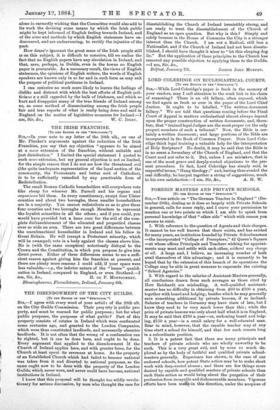THE DISENDOWMENT OF THE CITY GUILDS.
LTo THE SD/TOR OP THE " SPECTATOR."]
Sra,—I agree with every word of your articl, of the 29th ult. on the City Guilds Commission. Their pros arty is public pro- perty, and must be rescued for public purposes ; but for what public purposes, the purposes of what public P Part of this property consists of estates in Ireland which were confiscated some centuries ago, and granted to the London Companies, which were thus constituted landlords, and necessarily absentee landlords. It is not often that the wrong of a confiscation can be righted, but it can be done here, and ought to be done. Every argument that applied to the disendowment M the Church of Ireland applies here, and with greater force, for the Church at least spent its revenues at home. As the property of an Established Church which had failed to become national was taken from it and diverted to national purposes, so the same ought now to be done with the property of the London Guilds, which never were, and never could have become, national institutions in Ireland.
I know that this proposal will be thought too wildly revolu- tionary for serious discussion, by men who thought the case for
disestablishing the Church of Ireland irresistibly strong, and are ready to treat the disestablishment of the Church of England as an open question. But why is this P Simply and solely because in the House of Commons the City is a stronger interest than the Church. I am not a Radical, still less a Nationalist, and if the Church of Ireland had not been disesta- blished, I should have thought it wiser to "let this sleeping dog lie." But the application of these principles to the Church has removed any possible objection to applying them to the Guilds.
—I am, Sir, &c.,






































 Previous page
Previous page